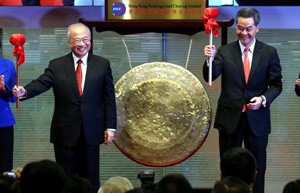Chinese firms strengthen presence in Gulf
Updated: 2014-11-24 11:16
By Lei Xiaoxun in Dubai(chinadaily.com.cn)
|
|||||||||
For any Chinese company, big or small, determined to establish a trustworthy presence and reputation in an overseas market, melting into the local markets and winning the trust of niche clients are the greatest challenges, said two executives of Chinese companies operating in Dubai's Jebel Ali Free Zone.
As Chinese economy enters a deep-water restructuring stage, companies such as Sinotrans and Hikvision are making unprecedented endeavors to expand their overseas business through Jafza, one of the world's largest free trade zones, that is keen to build its own eco-system to vie for more Chinese companies interested in establishing their presence there.
Operating in Jafza, foreign companies are allowed to have a 100 percent ownership without having to find a local sponsor who automatically takes a 51 percent share of the company, said Ibrahim Aljanahi, deputy CEO and chief commercial officer of Jafza.
With a strategic vision in the Middle East and North African region, Sinotrans, the biggest comprehensive logistics service supplier in China, fortified the company's local expansion by setting up a 50-50 joint venture with Almajdouie, a Saudi group of companies, which has a reputable competitive edge in the Gulf Cooperation Council countries.
"Almajdouie's reputation is the most important factor we valued," said Kevin Zhou, managing director of Sinotrans Middle East FZE, who also oversees Sinotrans' two other companies in Dubai - Maxx Logistics, the joint venture with Almajdouie, and Sinotrans Gulf Shipping LLC.
He said Maxx Logistics, which focuses on providing supply chain solution to big clients is the company's role model of overseas expansion and localization. With only five Chinese employees from Sinotrans, Maxx Logistics has a total headcount of 40.
The current business mode "helps us comprehend local culture and expand business reach in the Gulf region, especially in Saudi Arabia and the the United Arab Emirates", Zhou said, underlining the importance of taking in local talent and employment.
To facilitate that aspect, Jafza, which houses more than 175 Chinese companies, is offering one-stop service and tailor-made assistance to facilitate new companies to setup and expand both within and beyond the free zone, said Jeffrey Xl Yu, sales executive for Asia-Pacific of Jafza.
Following a similar but more cost-sensitive path, Hikvision, China's leading supplier of video surveillance products and solutions, is carefully tapping into the local markets by extensive cooperation with local contacts and agents.
"We are gradually winning the trust and confidence of our local partners and customers, it is a long and steady process and it takes time and patience," said Maxwell Wei, sales director of Hikvision Digital Technology Co Ltd.
Achieving a 10-fold revenue increase since Hikvision's establishment in Jafza in May 2010, sales of the company's products and services are expected to reach $50 million to $60 million this year, We said.
"We believe it is essential to have Emirati employee for extending out contacts with local industries and sorting out relationship with the government, although it is widely known Emiratis are expensive to employ in the UAE," said Wei.
He said Emirati employees in sales position with a management capacity are paid with an average monthly salary of about 30,000 dirhams ($8,170), without calculating bonus and commissions. The high cost of hiring Emiratis keeps Hikvison focusing on relying more on local partners to reach out for business opportunities in countries such as Turkey, the UAE, Qatar and Saudi Arabia.
The company has sealed contracts with Dubai Electricity and Water Authority and some of Turkey's major banks.
Both Zhou and Wei acknowledged that the only way for overseas Chinese companies to survive or flourish is to find their own methods to localize as soon as possible.
"In the past, Chinese companies in Dubai were mostly liaison offices of their parent companies back in China, but the tide is changing now as we are seriously building out overseas outposts into a concrete cause that every one here is dedicated to provide top-notch products and services, which is the key to any kind of successful localization for Chinese companies," Zhou said.

 Mascots from Olympic, Paralympic games arrive in Rio
Mascots from Olympic, Paralympic games arrive in Rio
 China's boxer Zou Shiming defeats unbeaten Thai
China's boxer Zou Shiming defeats unbeaten Thai
 Mountains echo to the sound of music
Mountains echo to the sound of music
 Chinese modern dance makes debut in Malta
Chinese modern dance makes debut in Malta
 Chocolate warriors with Christmassy characteristics
Chocolate warriors with Christmassy characteristics
 Trending: Panda beating video triggers outrage
Trending: Panda beating video triggers outrage
 Baidu introduces smart bike
Baidu introduces smart bike
 Culture Insider: 7 things you may not know about Minor Snow
Culture Insider: 7 things you may not know about Minor Snow
Most Viewed
Editor's Picks

|

|

|

|

|

|
Today's Top News
China, Pacific island nations boost ties
Media reveals aircraft carrier base spying case
Chinese newspaper, magazines punished
China's interest rates cut to bolster growth
Kekexili applies for world heritage
Banner year for US, NYC real estate investment
Obama takes executive action on immigration
Strong earthquake hits SW China
US Weekly

|

|








